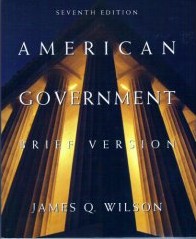| ||||||||
 Disclaimer
Disclaimer
 Links.
Links.
 Books read recently.
Books read recently.
 Best books read.
Best books read.
 Harry Potter books.
Harry Potter books.
| ||||||||

|
|
Text book [AGBV, 2005]:
American Government: Brief Version by James Q. Wilson
|
Chapters:
|
U.S. Modern History Glossary: A, B, C, D, E, F, G, H, I, J, K, L, M, N, O, P, Q, R, S, T, U, V, W, X, Y, Z.
Note: this site is not giving legal advice, simply organizing information from various Political Science classes and texts.
If you need legal advice consult your lawyer.
